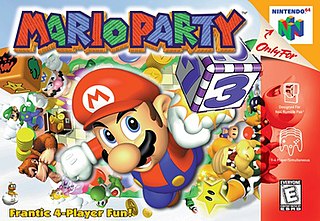
Mario Party is a 1998 party video game developed by Hudson Soft and published by Nintendo for the Nintendo 64. The game was targeted at a young audience. Mario creator Shigeru Miyamoto served as development supervisor. It received mostly positive critical reviews for its multiplayer mode, concept, and music; disapproval of its slow pacing; and mixed reviews of its graphics. It is the first installment in the Mario Party series and was followed by Mario Party 2 in 1999. The game received its first official re-release on the Nintendo Switch Online + Expansion Pack in 2022.

Mario Party 2 is a 1999 party video game developed by Hudson Soft and published by Nintendo for the Nintendo 64. The second game in the Mario Party series, it was released in Japan in December 1999 and worldwide in 2000. The game received mostly positive reviews, who praised the improvements they made to the original, the multiplayer and minigames, but criticized the lack of originality, while graphics received a better but otherwise mixed response.

Mario Party is a party video game series featuring characters from the Mario franchise in which up to four local players or computer-controlled characters compete in a board game interspersed with minigames. The games are currently developed by NDcube and published by Nintendo, being previously developed by Hudson Soft. The series is known for its party game elements, including the often unpredictable multiplayer modes that allow play with up to four, and sometimes eight, human players or CPUs.

A minigame is a short game often contained within another video game. A minigame contains different gameplay elements and is often smaller or more simplistic than the game in which it is contained.

Chibi-Robo! Plug Into Adventure! is a platform-adventure video game developed by Skip Ltd. and published by Nintendo for the GameCube console. It was released in Japan in 2005, and in North America and Europe the following year. Originally conceived as a point-and-click adventure game, it was put on developmental hold until Nintendo producer Shigeru Miyamoto gained interest in the title and overhauled its production.

Ape Escape is a series of video games developed primarily by Japan Studio and published by Sony Computer Entertainment, starting with Ape Escape for PlayStation in 1999. The series incorporates ape-related humour, unique gameplay, and a wide variety of pop culture references. The first game in the series is the first game to have made the DualShock or Dual Analog controller mandatory.
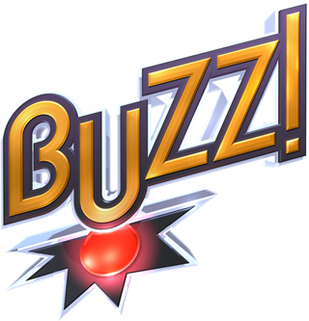
Buzz! is a series of video games originated by Sleepydog Ltd., developed by Relentless Software and published by Sony Computer Entertainment for the PlayStation 2, PlayStation 3 and PlayStation Portable consoles. They are quiz games that see the players answering trivia questions while competing in the fictional game show Buzz!. Created specifically with multi-player party gaming in mind, the series launched in October 2005 and to date comprises 18 games; including 13 in the Buzz! series and five Buzz! Junior titles. The series made the transition to the PlayStation 3 with Buzz!: Quiz TV in 2008. The sixteenth game in the series Buzz!: Brain of the UK was released in March 2009. The latest Buzz! game is Buzz!: The Ultimate Music Quiz which was released in October 2010.

Crash Boom Bang!, known in Japan as Crash Bandicoot Festival, is a party video game developed by Dimps and published by Vivendi Universal Games for the Nintendo DS. It was released in Japan in July 2006, North America and Europe in October 2006 and Australia in November 2006; the international releases were published under the Sierra Entertainment brand.

Buzz! Junior: Jungle Party is a party video game developed by Magenta Software and published by Sony Computer Entertainment for the PlayStation 2. It is the first game in the Buzz! Junior series. Jungle Party comprises forty different mini-games. Many of these mini-games require little knowledge or skill, so that they are more suited to younger children than the normal Buzz! quiz games, although they can also be enjoyed by older children or even adults. Cohort Studios developed a PlayStation 3 version where the player can use a DualShock wireless controller for the 1st time, yet is limited to only 5 playable mini-games. A PlayStation Portable version of the game was released in November 2010.
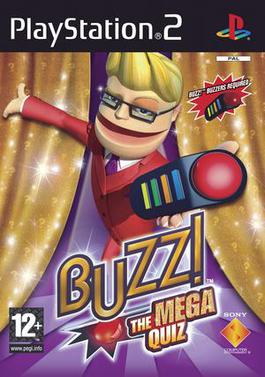
Buzz!: The Mega Quiz, released as Buzz! The Maha Quiz in India, was developed by Relentless Software and is the fourth game in the Buzz! series for the PlayStation 2, alongside Buzz! Junior: Robo Jam. Buzz! The Mega Quiz has over 5,000 questions. Along with Buzz! Junior: Jungle Party, this was one of the first Buzz games released in North America, also the first game in the series to have a 12+ rating by PEGI.
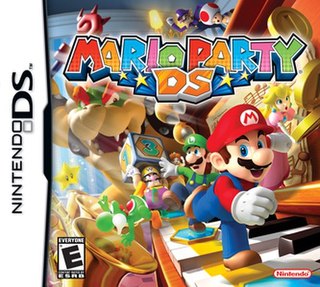
Mario Party DS is a 2007 party video game developed by Hudson Soft and published by Nintendo for the Nintendo DS. It is the second handheld game in the Mario Party series, as well as the last game in the series to be developed by Hudson Soft, as all subsequent titles have been developed by NDcube. The game was later released on the Virtual Console for the Wii U in April 2016.

Buzz! Junior: Monster Rumble is the third game in the Buzz! Junior series of games. Buzz! Junior: Monster Rumble was released on 2 November 2007 in Europe. Monster Rumble was co-developed by FreeStyleGames and Magenta Software and is published by Sony Computer Entertainment Europe. FreeStyleGames developed nineteen of the twenty-five mini-games, while Magenta created the following six: Boo!, Bashing Pumpkins, Eyeball Fall, Ghoulish Golf, All Wrapped Up, & Tug-O-War.
Magenta Software was a video game developer based in Liverpool, England.

Buzz! Junior: Dino Den is the fourth game in the Buzz! Junior series of party games. The game features dinosaurs as players. Buzz! Junior: Dino Den consists of thirty-five different mini-games, including ten new team mini-games. The game was developed by Cohort Studios and published by Sony Computer Entertainment Europe.

Cohort Studios was a games development and interactive entertainment studio. It was based in Dundee but closed its office there in May 2011.
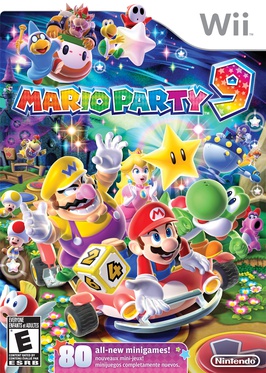
Mario Party 9 is a 2012 party video game developed by NDcube and published by Nintendo for the Wii. The ninth main installment in the Mario Party series, it was announced at E3 2011 and released in Europe, North America, and Australia in March 2012, followed by Japan a month later. It was the first game in the series not to be developed by Hudson Soft, which was acquired and dissolved by Konami on March 1, 2012, the day before the game's European release. Instead, development was taken over by Nintendo studio NDCube. This was also the final Mario game to be released on the Wii.

Pac-Man Party is a party game by Namco Bandai Games for the Wii and Nintendo 3DS. It is similar to the Mario Party series and Monopoly games for the Wii. In the game's story mode, players must retrieve a stolen cookie recipe from Pac-Man's enemies Blinky, Pinky, Inky, and Clyde and return it to its rightful owner, Mr. Cookie. The game was released to coincide with Pac-Man's 30th anniversary. The game notably features redesigns of the main characters which would carry over to following Pac-Man titles in the mid-2010s, culminating with Ghostly Adventures.

Game & Wario is a 2013 party video game developed by Nintendo and Intelligent Systems and published for the Wii U console, named after LCD Game & Watch titles. It is the eighth installment in the WarioWare series and part of the larger Mario franchise. The story stars Wario and his friends, who take advantage of a newly released video game console with two separate screens by making games for monetary gain. Game & Wario consists of 16 minigames that exclusively utilize the Wii U GamePad and its functions. Additional modes and collectibles are also unlockable. The majority of the minigames are single-player, although some are designed for multiplayer only.
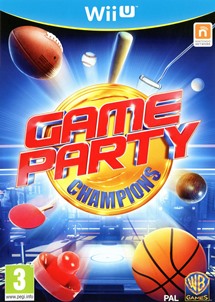
Game Party Champions is the fifth video game in the Game Party series, releasing as a launch title for the Wii U console in North America and Europe. It is the successor to Game Party: In Motion.
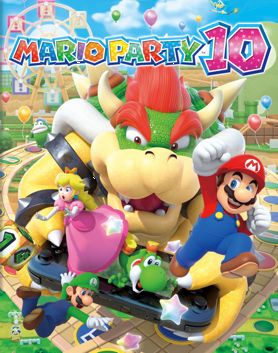
Mario Party 10 is a 2015 party video game developed by NDcube and published by Nintendo for the Wii U video game console. It is the tenth home console release in the Mario Party series and a part of the larger Mario franchise. Featuring gameplay similar to the prior series entries, players compete against each other and computer-controlled characters to collect the most mini-stars, traversing a game board and engaging in minigames and other challenges. There are multiple game modes, including one where players traverse a board in a vehicle, sabotaging each other and making choices to collect the most mini-stars by the end. Mario Party 10 adds two modes over its predecessors: Bowser Party, where four players compete in a team against a fifth who controls Bowser on the Wii U GamePad, and Amiibo Party, where players use Amiibo figures. Their gameplay is interspersed by over 70 minigames with various play styles.



















